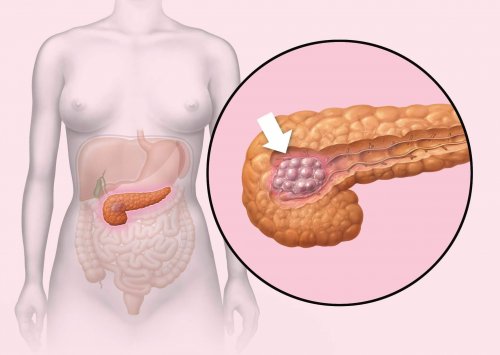The First Hormonal Symptoms of Pancreatic Cancer


Written and verified by the doctor Leonardo Biolatto
Pancreatic cancer is a disease that affects both male and female patients of any age. However, it’s usually more common in older men.
Scientists have not yet determined the cause. However, they have identified several risk factors, including age, smoking, obesity, diabetes, and pancreatitis, among others.
A brief overview of the pancreas
The pancreas is an elongated organ that lies behind the stomach and which carries out many important bodily functions. In fact, the pancreas is made up of two types of cells:
- Endocrine cells: These are usually in the pancreatic islets. Essentially, they produce hormones that they directly release into the bloodstream. They normally produce insulin and glucagon, and are able to regulate the amount of glucose in the bloodstream.
- Exocrine cells: On the other hand, these synthesize enzymes that travel to the duodenum through tiny ducts. They thus form the pancreatic duct. This then attaches to the bile duct (that comes from the liver) toward the small intestine. The enzymes they make aid in the digestion of certain nutrients such as lipids or fats.
Types of Pancreatic Cancer
There are two types of pancreatic cancer, depending on the type of cells that they affect. With this in mind, we find:
- Exocrine pancreatic cancer: This is the most common type of pancreatic cancer. In most cases, it develops in the cells that produce digestive enzymes.
- Pancreatic neuroendocrine tumors (malignant or cancerous): These affect the pancreatic islet cells that produce hormones, and then release them directly into the bloodstream. We can differentiate between the different subtypes depending on the type of cell the cancer affects (see the most common symptoms).
Read more here: 6 Habits That Help in the Prevention of Cancer
What are the most common symptoms of pancreatic cancer?

We should clarify that the symptoms may vary depending on the type of pancreatic cancer that the patient presents.
Exocrine pancreatic cancer
- Nausea and vomiting.
- Tiredness and constant fatigue.
- Loss of appetite – this often leads to undesired weight loss.
- Increase in the size of the gallbladder and/or liver.
- Abdominal discomfort that may then spread to nearby areas (such as the back).
- Jaundice or yellowing of the skin. This is because cancer blocks the common bile duct and, as a result, bilirubin builds up.
- Bilirubin is a pigment produced by the liver that normally reaches the duodenum through this duct.
- Other related symptoms are darker urine and changes in stool characteristics (changes in its hue and texture).
Discover: Dark or Cloudy Urine: 11 Possible Causes and Their Treatment
Here are some of its hormonal symptoms:
- Changes in the texture of the patient’s fatty tissue. This is due to the incorrect release of pancreatic enzymes.
- Diabetes: In this case, the exocrine cells destroy the cells that synthesize insulin. Therefore, blood glucose levels rise, and the characteristic symptoms of this disease manifest.
- Slight blood glucose levels alterations.
Pancreatic neuroendocrine tumors (malignant or cancerous): These depend on the type of cell that developed the cancer:
- Gastrinoma: The disease manifests in the cells that produce gastrin and increases its production. Generally, this substance helps synthesize more acid in the stomach. This condition is known by the name Zollinger-Ellison syndrome.
- Insulinoma: It affects the cells that produce insulin, which divide uncontrollably. It also causes hypoglycemia or low blood glucose levels.
- Glucagonoma: The cancer develops in the cells that produce glucagon. It causes hyperglycemia or elevated blood glucose levels.
- Somatostatinoma: Somatostatin normally helps regulate other hormones. This tumor can also alter the general levels of this substance.
- P-Poma: This is associated with an overproduction of pancreatic polypeptide (PP) which regulates the functions of the pancreas under normal conditions.
- VIPoma: It alters the cells that synthesize vasoactive intestinal peptide (VIP). The most notable symptom is prolonged diarrhea.
The work of the doctor
Once a person is diagnosed with pancreatic cancer, the doctor will indicate the most appropriate treatment options. Depending on the case, the patient will be presented with some specific alternatives or others. It should be noted that in some cases, more than one type of treatment can be used to care for the patient.
All cited sources were thoroughly reviewed by our team to ensure their quality, reliability, currency, and validity. The bibliography of this article was considered reliable and of academic or scientific accuracy.
- Mizrahi, J. D., Surana, R., Valle, J. W., & Shroff, R. T. (2020). Pancreatic cancer. Lancet (London, England), 395(10242), 2008–2020. https://pubmed.ncbi.nlm.nih.gov/32593337/
- Rojano, J., Storino, M., Serrano, R., Contreras, J., Almonte, L., Agreda, N., & Blanca, E. (2016). Sobrevida de los islotes β pancreáticos y uso de hipoglucemiantes orales: un gran reto para el médico actual. Revista Venezolana de Endocrinología y Metabolismo, 14(1), 5-15. https://ve.scielo.org/scielo.php?script=sci_arttext&pid=S1690-31102016000100002
- Puckett, Y. (2022). Pancreatic Cancer. StatPearls. https://www.ncbi.nlm.nih.gov/books/NBK518996/
- Asociación Española Contra el Cáncer. (s. f.). Síntomas: Cáncer de páncreas. Consultado el 19 de junio de 2023. https://www.contraelcancer.es/es/todo-sobre-cancer/tipos-cancer/cancer-pancreas/sintomas
- Sociedad Americana contra el Cáncer. (2019, 11 de febrero). Signos y síntomas del cáncer de páncreas. (s. f.). https://www.cancer.org/es/cancer/tipos/cancer-de-pancreas/deteccion-diagnostico-clasificacion-por-etapas/senales-y-sintomas.html
- Hendifar, A. E., Petzel, M. Q. B., Zimmers, T. A., Denlinger, C. S., Matrisian, L. M., Picozzi, V. J., Rahib, L., & Precision Promise Consortium (2019). Pancreas Cancer-Associated Weight Loss. The oncologist, 24(5), 691–701. https://www.ncbi.nlm.nih.gov/pmc/articles/PMC6516128/
- Vujasinovic, M., Valente, R., Del Chiaro, M., Permert, J., & Löhr, J. M. (2017). Pancreatic Exocrine Insufficiency in Pancreatic Cancer. Nutrients, 9(3), 183. https://www.ncbi.nlm.nih.gov/pmc/articles/PMC5372846/
- Liu, Z., Gou, A., & Wu, X. (2023). Liver metastasis of pancreatic cancer: the new choice at the crossroads. Hepatobiliary Surgery and Nutrition, 12(1), 88–91. https://www.ncbi.nlm.nih.gov/pmc/articles/PMC9944539/
- Bassari, R., & Koea, J. B. (2015). Jaundice associated pruritis: a review of pathophysiology and treatment. World Journal of Gastroenterology, 21(5), 1404–1413. https://www.ncbi.nlm.nih.gov/pmc/articles/PMC4316083/
- De La Cruz, M. S., Young, A. P., & Ruffin, M. T. (2014). Diagnosis and management of pancreatic cancer. American Family Physician, 89(8), 626–632. https://pubmed.ncbi.nlm.nih.gov/24784121/
- Navari R. M. (2020). Nausea and Vomiting in Advanced Cancer. Current Treatment Options in Oncology, 21(2), 14. https://pubmed.ncbi.nlm.nih.gov/32025954/
- Di Marco, M., Rubbi, I., Baldi, A., Di Lorenzo, R., Magnani, D., Cremonini, V., Sarli, L., Artioli, G., & Ferri, P. (2018). Evaluation of fatigue in patients with pancreatic cancer receiving chemotherapy treatment: a cross-sectional observational study. Acta Bio-medica : Atenei Parmensis, 89(4-S), 18–27. https://www.ncbi.nlm.nih.gov/pmc/articles/PMC6357627/
- Coveler, A. L., Mizrahi, J., Eastman, B., Apisarnthanarax, S. J., Dalal, S., McNearney, T., Pant, S., & Precision Promise Consortium (2021). Pancreas Cancer-Associated Pain Management. The Oncologist, 26(6), e971–e982. https://pubmed.ncbi.nlm.nih.gov/33885205/
This text is provided for informational purposes only and does not replace consultation with a professional. If in doubt, consult your specialist.








